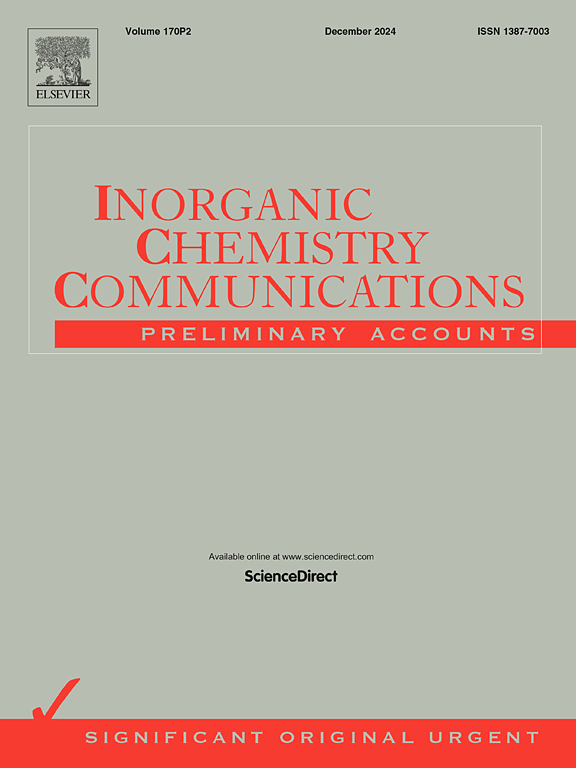含硫醚配体的 W/Cu/S 簇基配位聚合物的合成、结构表征和三阶非线性光学研究
IF 4.4
3区 化学
Q1 CHEMISTRY, INORGANIC & NUCLEAR
引用次数: 0
摘要
[Et4N][Tp*WS3](Et = 乙基,Tp* = 四(3,5-二甲基-1-吡唑基)硼酸酯)、Cu(I)与 1,3,5-三((吡啶-4-基硫基)甲基)苯 (tptmb) 或 4,4′-双((吡啶-4-基硫基)甲基)-1、1′-联苯(bptmb)产生两种配位聚合物,其分子式分别为{[Tp*WS3Cu3(tptmb)(CH3CN)](PF6)2-CHCl3-2CH3CN}n(1-CHCl3-2CH3CN)和{[(Tp*WS3Cu3)2(bptmb)3(CH3CN)](PF6)4-5CH2Cl2-1.5CH3CN}n(2-5CH2Cl2-1.5CH3CN)。化合物 1 和 2 通过元素分析、红外光谱、紫外-可见光谱、高分辨率电喷雾电离质谱和单晶 X 射线衍射进行了表征。在 1 中,每个 tptmb 配体通过其三个配位臂连接两个相邻的簇节点,形成一个基于簇的一维之字链。在 2 中,等量的[Tp*WS3Cu3(CH3CN)]2+ 和[Tp*WS3Cu3]2+ 簇作为三连接节点,并由 bptmb 配体交替桥接,形成二维网络。在二甲基甲酰胺(DMF)溶液中对 1 和 2 进行的 Z 扫描测试表明,它们具有反向饱和吸收,1 的有效非线性吸收系数为 1.50 × 10-11 m/W,2 的有效非线性吸收系数为 5.00 × 10-11 m/W。这项工作可启发人们利用簇节点和灵活的含硫醚配体构建配位聚合物结构,为开发三阶非线性光学材料提供新的途径。本文章由计算机程序翻译,如有差异,请以英文原文为准。

Synthesis, structural characterization and third-order nonlinear optical study of W/Cu/S cluster-based coordination polymers with thioether-containing ligands
The assembly of [Et4N][Tp*WS3] (Et = ethyl, Tp* = tetrakis(3,5-dimethyl-1-pyrazolyl)borate), Cu(I) with 1,3,5-tri((pyridin-4-ylthio)methyl)benzene (tptmb) or 4,4′-bis((pyridin-4-ylthio)methyl)-1,1′-biphenyl (bptmb) leads to two coordination polymer with the formulae of {[Tp*WS3Cu3(tptmb)(CH3CN)](PF6)2·CHCl3·2CH3CN}n (1·CHCl3·2CH3CN) and {[(Tp*WS3Cu3)2(bptmb)3(CH3CN)](PF6)4·5CH2Cl2·1.5CH3CN}n (2·5CH2Cl2·1.5CH3CN), respectively. Compounds 1 and 2 were characterized by elemental analysis, infrared spectroscopy, UV–vis spectroscopy, high-resolution electrospray ionization mass spectrometry, and single-crystal X-ray diffraction. In 1, each tptmb ligand connects two adjacent cluster nodes by its three coordination arms, forming a cluster-based one-dimensional zigzag chain. In 2, equal amounts of [Tp*WS3Cu3(CH3CN)]2+ and [Tp*WS3Cu3]2+ clusters serve as three-connected nodes and are alternatively bridged by the bptmb ligands, forming a 2D network. Z-scan tests of 1 and 2 in dimethylformamide (DMF) solution reveal they have reverse saturable absorption with effective nonlinear absorption coefficients of 1.50 × 10−11 m/W for 1 and 5.00 × 10−11 m/W for 2. This work could inspire the construction of coordination polymer structures using cluster nodes and flexible thioether-containing ligands, providing a new way for the development of third-order nonlinear optical materials.
求助全文
通过发布文献求助,成功后即可免费获取论文全文。
去求助
来源期刊

Inorganic Chemistry Communications
化学-无机化学与核化学
CiteScore
5.50
自引率
7.90%
发文量
1013
审稿时长
53 days
期刊介绍:
Launched in January 1998, Inorganic Chemistry Communications is an international journal dedicated to the rapid publication of short communications in the major areas of inorganic, organometallic and supramolecular chemistry. Topics include synthetic and reaction chemistry, kinetics and mechanisms of reactions, bioinorganic chemistry, photochemistry and the use of metal and organometallic compounds in stoichiometric and catalytic synthesis or organic compounds.
 求助内容:
求助内容: 应助结果提醒方式:
应助结果提醒方式:


